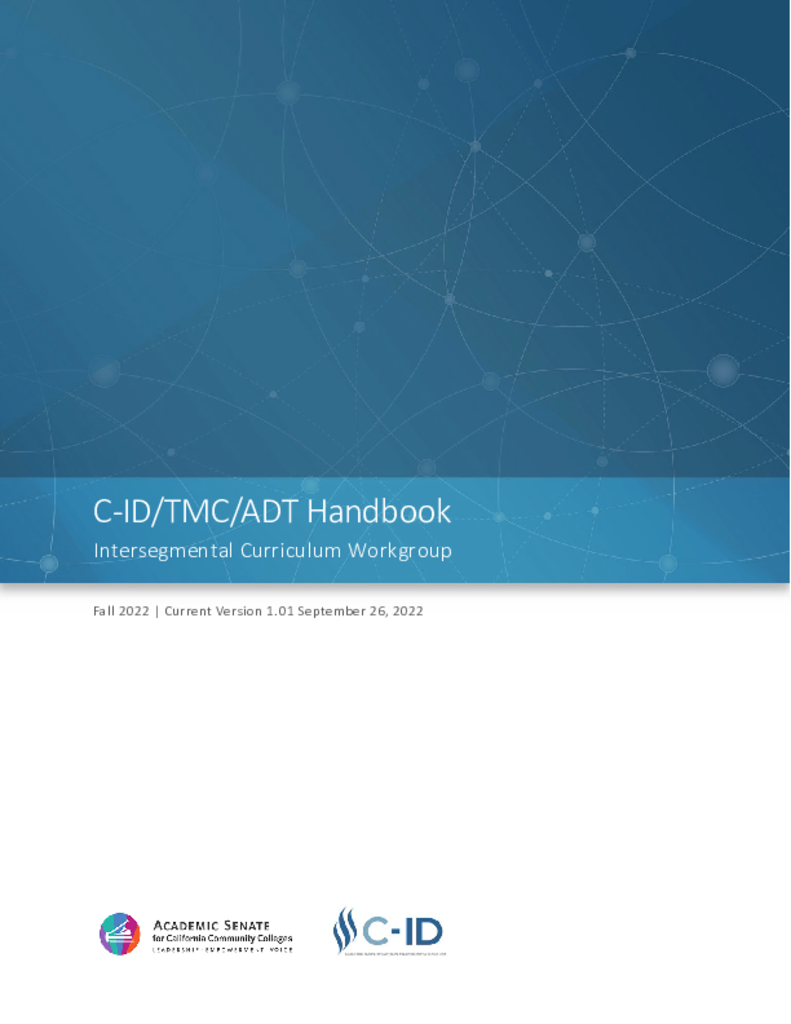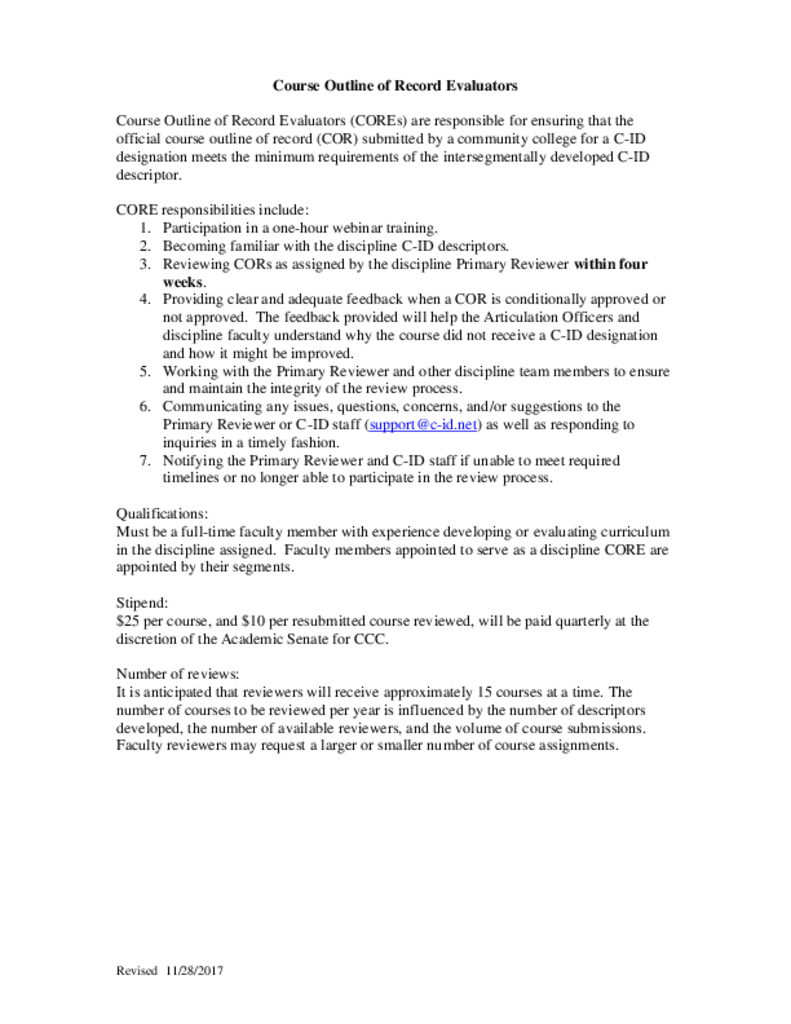Thank you for your interest in statewide C-ID work. Faculty contributions to this intersegmental process are essential for the success of our Associate Degree for Transfer (ADT) pathways.
A CSU faculty member submits to participate in C-ID review work and the appointment will be reviewed by the ASCSU Executive Committee. The different group and board roles that faculty members can fill are described below and can be found at the C-ID website This link will take you to an external website in a new tab.. The most frequent and regular needs are for Course Outline of Record Evaluators (COREs) and Faculty Discipline Review Group (FDRG) members.
Submit to participate through one of these three ways:
- Complete the CSUCO C-ID Participation Form This link will take you to an external website in a new tab. OR
- Complete the C-ID CORE Participant Information Survey This link will take you to an external website in a new tab. OR
- Send an email to Marci Sanchez, Asst. Director, Undergraduate Transfer Programs at msanchez@calstate.edu or c-idsupport@asccc.org
Once the submission information is collected, these are the next steps in the process:
- the discipline is reviewed by both the CSUCO and C-ID for need;
- if needed, the nomination is sent to the ASCSU Executive Committee for review, and the results are shared with the nominee;
- if approved, the faculty information is shared with C-ID and their staff members share the training process and upcoming timelines.
The following handbook describes the history of the Course Identification (C-ID) Number program and the various roles, responsibilities and processes for this work.

DISCIPLINE INPUT GROUP (DIGs)
Large Faculty meetings where select disciplines review the lower division major preparation for their areas and begin to develop C-ID descriptors.
C-ID ADVISORY BOARD
Provides oversight and direction related to policies and processes for C-ID descriptor development, review, revision, and deletion. Faculty appointments are made through ASCSU.
Responsibilities:
- Develop, periodically review and revise (as necessary) policies and processes related to C-ID
- Affirm the outcome of a Faculty Discipline Review Group (FDRG) review process related to C-ID descriptors
- Approve new or revised C-ID descriptors or C-ID descriptor deletion as recommended by FDRGs
INTERSEGMENTAL CURRICULUM COUNCIL (ICC)
Serves as an intersegmental oversight body that reviews and approves policies, criteria, and processes for developing, reviewing, revising, and deleting intersegmental curriculum including Transfer Model Curricula (TMCs). Faculty appointments are made through ASCSU.
Responsibilities:
- Develop or modify criteria for new TMC development
- Ensure that TMC review and discontinuance processes (as established by ICC) are followed
- Act in lieu of an incomplete FDRG when warranted.
- Provide direction and guidance to the C-ID Advisory Committee, Discipline Input Groups (DIGs), and Faculty Discipline Review Groups (FDRGs), Intersegmental Curriculum Faculty Workgroup (ICFW)
- Work with intersegmental stakeholders to meet student needs by working to implement and align TMCs and Model Curriculum (MCs) to other transfer pathways where appropriate.
COURSE OUTLINE OF RECORD EVALUATORS (CORE)
The CORE faculty members are responsible for reviewing and approving all community college courses that are used in the TMC templates as the foundation for the community colleges' AA-T or AS-T degrees. Individual lower-division community college courses awarded a C-ID number reflect the published descriptor that is included in the TMC and the ADT, thus assuring our CSU campuses that students who succeed in those classes should be well-prepared for upper-division work or, in the case of local degrees and certificates, are career-ready.
Description of the Course Outline of Record Evaluators (CORE) Role

- Academic Senate CSU Resolution: ASCSU Resolution-3346-18- C-ID_CORE_Appointments.pdf This link will open a PDF file. (pdf)
FACULTY DISCIPLINE REVIEW GROUP (FDRG)
FDRG members are appointed by their segment Academic Senates. The FDRG members are responsible for drafting and reviewing feedback on the curricula and actively work to finalize the draft curricula developed for their disciplines. FDRGs are also assembled to discuss, develop, review, and revise course descriptors for C-ID. Each discipline group is comprised of faculty from the community college and CSU systems. In cases that involve only local CCC degrees and certificates, the FDRG may only include CCC representatives. Because C-ID is predicated on faculty-to-faculty dialogue, each FDRG is facilitated by a lead discipline faculty member or FDRG Lead.
Members of the FDRG are responsible for a variety of tasks including:
- Identification of those courses which are common major components in their field. The FDRGs must determine which courses within the discipline need descriptors and a C-ID number.
- Assignment of a supra-number to those prioritized courses based on the C-ID numbering protocol.
- Development (or review) and approval of C-ID descriptors for those numbered courses. Individual lower-division courses awarded a C-ID number will reflect the published descriptor and will further assure institutions that students succeed in those classes should be well-prepared for upper-division work or, in the case of local degrees and certificates, are career-ready.
Description of the Faculty Discipline Review Group (FDRG) role

- Academic Senate CSU Resolution: ASCSU Resolution 3355-18 Req for C-ID FDRG AppointmentsThis link will open a PDF file. (pdf)
More information regarding the work of C-ID can be found here: c-id.net. This link will take you to an external website in a new tab.
